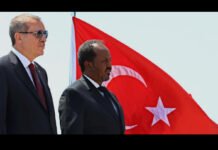MOGADISHU, (HAN) – Somalia has earned rare diplomatic praise for its cautious and balanced handling of one of Africa’s most divisive disputes: the row between Ethiopia and Egypt over the Grand Ethiopian Renaissance Dam (GERD).
The $5 billion project on the Blue Nile, near Ethiopia’s border with Sudan, is the largest hydroelectric dam in Africa. Ethiopia regards it as a cornerstone of national development, promising electricity for more than 110 million citizens and a potential source of revenue through power exports.
Egypt, however, fears the massive reservoir could sharply reduce its share of the Nile’s waters, a river it has relied on for agriculture, industry, and human survival for centuries.
The GERD dispute has triggered years of tense negotiations, international mediation, and occasional threats of confrontation. While Sudan and other regional actors have taken shifting positions, many African and Arab countries have found it difficult to balance relations with both Addis Ababa and Cairo.
Somalia’s Neutral Position
Amid these tensions, Somalia has charted a careful course. The federal government in Mogadishu has avoided siding openly with either Ethiopia or Egypt, instead stressing the importance of dialogue and regional stability.
By doing so, Somalia has sustained its strategic relationship with Ethiopia — a powerful neighbor whose troops are deeply involved in Somalia’s security through the African Union Mission in Somalia (AUSSOM). At the same time, Somalia has preserved its historic and cultural ties with Egypt and the wider Arab League, where Cairo wields significant influence.
“Somalia is showing it can defend its national interests without being dragged into regional rivalries,” said a Horn of Africa political commentator. “This kind of balanced diplomacy marks a shift from the country’s past isolation.”
Why Balance Matters
For Somalia, neutrality is more than a diplomatic gesture. Its leaders know that leaning too far toward either side could carry heavy costs:
- Closer alignment with Ethiopia might jeopardize support from Egypt and Arab allies, particularly on issues such as debt relief, economic aid, and international lobbying.
- Backing Egypt too strongly could strain ties with Ethiopia, which remains a key partner in security operations against Al-Shabaab and a major trade route for Somali goods.
By walking this tightrope, Somalia has projected itself as a maturing actor in regional politics — one that values stability and pragmatic relationships over short-term gains.
A Sign of Broader Shifts
Analysts see Somalia’s stance on the GERD dispute as part of a broader attempt to rebuild its foreign policy credibility after three decades of state collapse and civil war. Alongside domestic reforms, such as reclaiming public land and introducing an e-visa system, the government has sought to portray itself as capable of making decisions that align with both national and international interests.
Still, challenges remain. Somalia’s internal political divisions, tensions between federal and regional states, and ongoing insecurity continue to test its ability to present a unified voice abroad. Critics warn that while Mogadishu’s neutral stance on the GERD is commendable, it must be backed by consistent engagement in regional forums to avoid being sidelined.
Looking Ahead
As Ethiopia presses forward with filling the GERD reservoir and Egypt pushes for binding agreements on water flow, Somalia’s balancing act will remain delicate. For now, its neutral stance has won quiet praise, with observers saying it shows a rare glimpse of Somali diplomacy guided by pragmatism rather than external pressure.
“Somalia’s foreign policy is still fragile,” said a regional analyst. “But its approach to the GERD dispute suggests a country learning how to place national interest above regional rivalries — and that is a significant step forward.”





